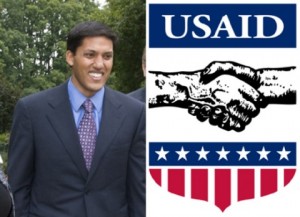Posted on June 14, 2010
 Do you believe in the mission of the Peace Corps? Do you think that more Americans should be given the opportunity to serve their country by living and working in a developing country? Take a look at the Push for Peace Corps Campaign website, and consider helping them in their quest to expand and improve the Peace Corps.
Do you believe in the mission of the Peace Corps? Do you think that more Americans should be given the opportunity to serve their country by living and working in a developing country? Take a look at the Push for Peace Corps Campaign website, and consider helping them in their quest to expand and improve the Peace Corps.
According to the campaign website, in 2009 more than 15,000 people applied for fewer than 3,700 open positions. The Push for Peace Corps Campaign aims to double the size of the Peace Corps from under 8,000 volunteers to at least 16,000 total volunteers. It also aims to improve Peace Corps recruitment, placement, and programs, to make the Peace Corps a better experience for volunteers and communities alike. To do this, the campaign supports increasing the Peace Corps budget, such as in legislation introduced by Senator Chris Dodd (S. 1382) and Congressman Sam Farr (H.R. 1066).
Are you an RPCV? The Push for Peace Corps Campaign needs your story. They are asking for stories submitted by any and all RPCVs, in support of the $65 million increase for the Peace Corps’ budget. Please submit your story to Rajeev@pushforpeacecorps.org by Friday, June 18th. Write “my story in support of 10,000 volunteers” in the subject line, and keep your story to 200 words or less. Include your name, address, years & country of Peace Corps service, and any titles you wish to include. You may attach a photo to your email.
Posted on June 7, 2010
 On June 2, USAID Administrator Dr. Rajiv Shah spoke to the InterAction Forum about planned reforms at USAID. You can read the full text of his candid and impassioned speech here.
On June 2, USAID Administrator Dr. Rajiv Shah spoke to the InterAction Forum about planned reforms at USAID. You can read the full text of his candid and impassioned speech here.
From Dr. Shah’s speech, we get the sense that change really is in the air at USAID. His key point was that we are in a unique window of opportunity for change over the next 12-18 months. There is currently an unprecedented political opportunity for global development policy reform: we have a supportive President, Secretary of State, Secretary of Defense, and Joint Chiefs of Staffs. Congressional leaders also support reforming foreign aid. And we are approaching the 50th anniversary of the Foreign Assistance Act, USAID, and the Peace Corps.
Dr. Shah emphasized that USAID is starting to do things differently. Here are some of the changes planned for USAID:
- more evidence-based programming
- improving effectiveness to stretch tax dollars
- building institutional capacity in partner governments, and aligning programs with local needs and priorities
- creating incentives for good governance
- working towards greater policy and budget capability at USAID
- requesting greater flexibility from Congress
- implementing procurement reform
- broadening USAID’s base of partner organizations
- prioritizing “true and effective” transparency
- treating Foreign Service Nationals better, giving them opportunities and respecting them as professionals
- reducing the data-collection burden on USAID missions and partners, while using the collected data more effectively in planning
The main challenge to reform that Dr. Shah identified is resistance from Congress, because during hard economic times anything having to do with foreign aid is a tough sell.
Dr. Shah also made some requests to InterAction member organizations:
- be more transparent about how funds are being spent, getting the money out of the beltway and into countries
- invest more in training local resources, instead of American experts
- create the conditions for a long-term exit
All in all, an interesting speech and a recommended read.
Posted on June 3, 2010

Digging a toilet by communal labor in Fotobi (Eastern Region), Ghana
by Brett Walton, guest blogger
With five years until the deadline for achieving the Millennium Development Goals, the United Nations has released a series of progress reports. The water and sanitation April 2010 update states that the world is on track to meet the drinking water goal, but will fall far short of the target for sanitation. The problem with the MDGs, however, is that they don’t measure what you think they measure.
The UN established the Millennium Development Goals in 2000 as a metric for improving the lives of the world’s poorest. The goals cover economic, physical and social well-being: maternal health, poverty, gender equality. The MDGs for water and sanitation seek to reduce by half the number of people without access to improved drinking water sources and improved sanitation. The UN provides a list of what qualifies as an ‘improved’ source – boreholes, in-house connections, protected wells, rainwater collection – but the dirty little secret of the drinking water target is that it has nothing to do with the water’s quality.
The water goal is a target that assess infrastructure, not water quality. A community can be using an improved source while still drinking tainted water. A pilot study by the World Health Organization found that the majority of piped systems deliver quality water, but only 40-70 percent of other improved sources meet WHO microbial standards.
This is why the theme of World Water Day this year was water quality. I was in Nairobi, Kenya covering the day’s events for Circle of Blue, a non-profit news agency reporting on water issues, and listened to many speakers discuss the consequences of dirty water. To wit, half of all hospital beds in the developing world are occupied by people with a water-related illness; roughly 90 percent of the waste water in developing countries is dumped untreated into water bodies; and more than 2.6 billion people lack adequate sanitation facilities.
Water and sanitation are not separate problems, but they are sometimes treated as such. “No policymaker will tell you sanitation comes before drinking water,” said Maurice Bernard from the French Development Agency. Yet, if the drinking water MDG is to have any meaning, it must go hand in hand with sanitation improvements.
Development money alone is not a solution. Zafar Adeel, the UN water chief, told me that past failures occurred because the approach was too technical.
“What historically we have done is to stay focused on water quality, on monitoring and research, but relating it to people’s lives and policies is something that we have not done very well before,” he said.
Bernard said that if he were given $10 billion to invest in clean water he would put it towards capacity building; that is, investment in management, governance and social capital.
National governments, he said, are where most solutions will take place.
It’s difficult to get a handle on a problem you can’t measure. Many people in Nairobi admitted that we don’t know how many people have clean water because it is quite expensive to carry out micro-level water quality testing on a broad scale. To that end, WHO and UNICEF are doing pilot tests in several countries.
Knowing the extent of the problem is a first step. Applying the right medicine is a much farther bound.
 Do you believe in the mission of the Peace Corps? Do you think that more Americans should be given the opportunity to serve their country by living and working in a developing country? Take a look at the Push for Peace Corps Campaign website, and consider helping them in their quest to expand and improve the Peace Corps.
Do you believe in the mission of the Peace Corps? Do you think that more Americans should be given the opportunity to serve their country by living and working in a developing country? Take a look at the Push for Peace Corps Campaign website, and consider helping them in their quest to expand and improve the Peace Corps. 
